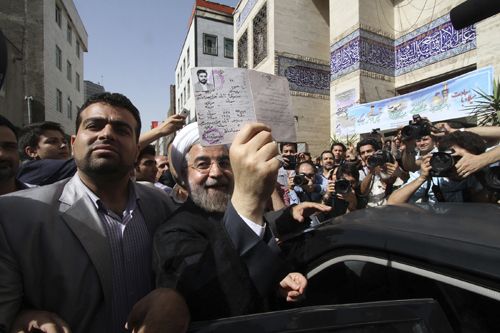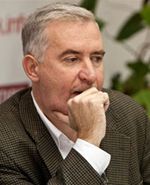“A new chance for those who respect democracy”
A reformer suddenly became the president of Iran. Will he fulfill his promises?
The results of the presidential elections in Iran that took place on June 14 turned out to be quite unexpected. In this election, centrist reformer 65-year-old Hassan Rouhani won the first round with the 50.7 percent of the votes. The Day reported before that eight candidates, majority of which were conservatives, were allowed to participate in the presidential race. Previously, the 48-year-old Secretary of the Supreme National Security Council Saeed Jalili was considered the protege of the spiritual leader of Iran Ali Khamenei, who de facto controls the country. But just a few days before the vote, the victory was predicted for the reformer Rouhani.
This was caused, as noted by experts, above all by the election campaign of the centrist reformer called “Hope and Sanity.” During his campaign Rouhani tried to reach out to traditional conservatives and reform-minded voters. In addition, another representative of the reformist wing, the former vice president Mohammad Reza Aref dropped out of the race. Of course, this has improved the chances of Rouhani, since the reformers no longer had to compete between themselves. But, perhaps, the most crucial factor that contributed to his victory was the support of two former presidents Mohammad Khatami and Akbar Hashemi Rafsanjani, the latter, by the way, was not approved to participate in the election.
During his campaign Rouhani spoke about reforms without posing any threat to the supreme leader of Iran or his institutions that brought him to power. Former Secretary of the Supreme National Security Council had promised greater personal freedom and even pointed out that he would release political prisoners and detained journalists. Rouhani promised to improve the economy, reduce unemployment, and, as a former negotiator on nuclear issues, said that he would reduce tension between Iran and the outside world, removing the issue of sanctions against Iran over its nuclear program.
Right after the results of the election had been announced, the newly elected president made a public statement, in which he called his victory “a new chance for those who respect democracy, cooperation, and open dialog.” He thanked God for that “again the sun of prudence and moderation is shining on Iran and is sending the world the voice of unity and cohesion of the country.”
On June 16 tens of thousands of people took to the streets in Tehran to celebrate the victory of Rouhani. The streets of the Iranian capital were literally seized in red – the color that became the symbol of Rouhani’s campaign. By the way, the spiritual leader of Iran Ayatollah Khamenei has already congratulated Rouhani on his victory. The newly elected president will be sworn in service before the Parliament and will take up his duties on August 3.
Commenting on the elections, the White House expressed concern about the “lack of transparency in the election procedure,” but at the same time expressed readiness for direct dialog with Tehran on the issue of Iran’s nuclear program. “The Administration of the President Barack Obama believes that the Iranian government will listen to the will of the Iranian people and will be able to make responsible decisions that would ensure a better future for all Iranians,” says the statement made by the spokesman for the White House. In his turn, Russian President Vladimir Putin proposed Hassan Rouhani to strengthen the relations with Moscow. Prime Minister of Israel Benjamin Netanyahu appealed to the international community to continue to put pressure on the Iranian government to make them close the nuclear program. The official Paris expressed willingness to work with the new government of Iran, while the British Foreign Office urged Rouhani “to follow a new course,” reminding him of the international concern over Tehran’s actions in the nuclear field and the human rights situation. UN Secretary General Ban Ki-moon offered his congratulations and urged Iran to play a constructive part in regional and international matters. In Syria, where Civil War has been on for the last two years, the opposition coalition expressed hope that Rouhani would put an end to Iran’s support of the President Bashar al-Assad.
According to observers, the restrained reaction of the international community is caused by the fact that the real power in Iran remains in the hands of the spiritual leader and his conservative surroundings. One of the Rouhani’s promises during the election campaign was to achieve lifting of international sanctions related to Iran’s nuclear program. Shortly before that in Tehran there were calls to release political prisoners. Apparently, Rouhani is positive about this idea. “Nations that profess democracy and openness should now speak with the Iranian people with respect and recognize the rights of the Islamic Republic,” said Hassan Rouhani.
COMMENTARY
“ANY IMPROVEMENT OF THE SITUATION IN IRAN AND ITS RELATIONS WITH THE WEST WORK FOR THE GOOD OF UKRAINE AS WELL”
Oleksandr BOHOMOLOV, Director of the Center for Middle Eastern Studies:
 “You’ve got to keep in mind that Iran does not have full democracy. Because a system, that has institutions of power outside the election system, cannot be fully democratic. But I think that the Islamic leadership cannot ignore the fact that due to its rather aggressive policy in the region and the wider world arena, the country has faced numerous problems, first and foremost – the internal problems. As a result of the imposed sanctions the life of ordinary Iranian people becomes increasingly difficult. The economic situation in the country is very poor and Iran is on the verge of a serious crisis.
“You’ve got to keep in mind that Iran does not have full democracy. Because a system, that has institutions of power outside the election system, cannot be fully democratic. But I think that the Islamic leadership cannot ignore the fact that due to its rather aggressive policy in the region and the wider world arena, the country has faced numerous problems, first and foremost – the internal problems. As a result of the imposed sanctions the life of ordinary Iranian people becomes increasingly difficult. The economic situation in the country is very poor and Iran is on the verge of a serious crisis.
“If conservatives led by the spiritual leader would have had a strong desire, they could replay the same situation that we witnessed in the previous presidential election. In one way or another they could have pushed some conservative candidate, or even supersede any conventionally moderate liberals from the list of candidates. It was under their jurisdiction.
“Besides, there is no unity in the conservative camp. There are very serious internal disputes. The country has, after all, to get out of this stalemate, in which it found itself. I think that the situation was somewhat stage-managed. Although, there would have been no such vote outcome if there was no demand of the majority of Iranians for still a more moderate leader. We observed that this trend appeared before in the form of failed the so-called ‘green’ revolution during the previous elections. In a state Iran is now, it would not have survived another crisis. Rouhani, even though he is called a reformer, in fact, is not the most powerful figure in the liberal establishment. He is close to Khamenei and his supporters. That means that he is a politician who has roots in the same establishment. One might say that he is a compromise figure.”
How could you explain the fact that he managed to win in the first round?
“Iranian voters considered the choice they’ve got quite realistically, even though there was no choice as such. People who wanted to vote for a liberal candidate did not have any other candidature. All the leading figures in the country supported Rouhani and gave, so to speak, their votes to him. One can say that the opposition has put forward a single candidate, if the situation could be described using our realities. The opposition had to do so.”
As we know already former president Mahmoud Ahmadinejad made a lot of promises in his election campaign, but the situation in the country only worsened under his rule. Will the newly elected president of Iran be able to fulfill his promises?
“Iran has plunged too deeply into its internal problems and the problems at the international and regional level. And if you listen to Arabic comments, the attitude towards Iran is very negative. Iran, to say the least, is not a popular state among its neighbors. This is due, among other things, to the Shiite-Sunni war sponsored by Iran. The deterioration of the situation in Iraq is directly attributed to the influence of Iran. The Syrian opposition says plainly and its position is supported by other Sunni Arab countries that now there is a big issue of the Iran’s aggression against Syria, even though it is mediated through Hezbollah sponsored by Iran.”
Will the new president be able to resolve this issue?
“This is a big problem. The thing here is that the figure of the president, despite all the promises he made, has very limited powers. This is the highest elected office. But there are still many powers above this post that are not available to its holder. Ahmadinejad tried to get more power and, in fact, got hurt for that. His protege was not even included in the list of candidates. He felt the inferiority of the presidency in the state. Obviously, the managed presidency remains managed.
“Part of Rouhani’s promises deals with improving relations with the West. In fact, Iran’s foreign policy is not determined by the president. This probably means one thing – either he has hopes or there is a possible consensus between him and the Islamic leadership, the spiritual leader and his entourage, that some things need to be changed and the relations with the West should be improved. But the question is how this has to be done after so many negative things have already happened. It could be very difficult.”
How should Ukraine interpret the results of the elections in Iran?
“Any improvement of the situation in Iran and its relations with the West work for the good of Ukraine as well. Ukraine has direct economic and political interests in Iran. Iran is a huge gas supplier. Therefore, normalization would be beneficial for Ukraine, which is interested in the sources of gas supply to Europe. Besides, Iran is a part of the market. That is why lifting the sanctions against Iran will open new opportunities for selling Ukrainian product. The liberal regime in Iran is better than illiberal, however, a democratic regime would be even better. But there is no hope for that in the near future.”






